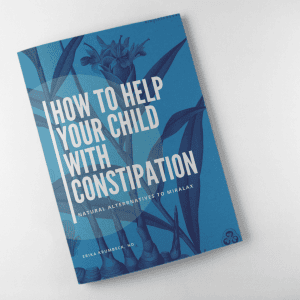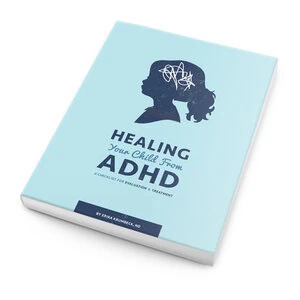Supplementing vitamin B6 in children and teens: PMS, ADHD, autism and more!
Are you a healthcare provider? Read our research summary of Vitamin B6 on Naturopathic Pediatrics PRO, our website for professionals.
What is Vitamin B6?
Vitamin B6, also called pyridoxine, is one of the essential nutrients that helps our children grow, thrive, and feel their best. It’s a water-soluble vitamin, meaning our bodies don’t store it—we have to get it regularly from food or supplements.
Vitamin B6 plays a part in more than 100 different processes in the body. It helps us make energy, supports our immune system, helps create hemoglobin (which carries oxygen in the blood), and keeps blood sugar levels steady. But one of its most important jobs is supporting brain function and mood.
Why is Vitamin B6 Important for Mental Health?
Vitamin B6 is needed to produce many of the “feel-good” brain chemicals, called neurotransmitters. These include serotonin (which helps regulate mood and sleep), dopamine (which helps with focus and motivation), GABA (which helps us feel calm), and others like epinephrine and glycine. Without enough vitamin B6, kids may struggle with mood swings, irritability, or trouble focusing.
It’s also involved in how the body processes tryptophan, an amino acid that’s used to make serotonin. Without enough B6, tryptophan can turn into substances that may negatively affect brain health. That’s why some doctors who treat children with autism or ADHD look closely at vitamin B6 levels and how the body is using it.

Food Sources of Vitamin B6
Vitamin B6 can be found in many foods of both plant and animal origin. Pyridoxine is the form found exclusively in plant foods and comes from whole grains, potatoes, bananas, nuts and seeds. Pyridoxal is mostly found in animal products and comes from beef, fish, chicken and pork. The vitamin B6 found in plant foods is slightly less bioavailable than the vitamin B6 consumed from animal products. Some rich sources of vitamin B6 are:
- Chickpeas
- Chicken and Turkey
- Fish, especially Tuna and Salmon
- Beef
- Potatoes
- Winter Squash
- Banana
- and most fruits, except citrus fruits
What are the signs of vitamin B6 deficiency?
It’s not very common to have a vitamin B6 deficiency, especially if your child is eating a balanced diet. But certain conditions can lead to low levels—especially if there are problems with nutrient absorption, like with celiac disease or inflammatory bowel conditions. Some medications, like anti-seizure drugs, can also deplete vitamin B6 over time.
Signs of a deficiency might include:
- Cracks in the corners of the mouth
- Fatigue or low energy
- A swollen, sore tongue
- Rashes or dry skin on the face or shoulders
- Irritability or depression
- Tingling in the hands or feet (called neuropathy)
- In babies, more severe symptoms like seizures or extreme fussiness
Even if a child isn’t fully deficient, having suboptimal B6 levels may still cause neurological or behavioral symptoms in certain kids.
Vitamin B6 Toxicity: what are the dangers of taking too much vitamin B6?
It’s very rare to get too much B6 from food—but taking large doses from supplements for a long time can cause problems. The main concern is sensory neuropathy, where kids may feel numbness or tingling in the hands and feet, or have trouble with coordination.
This is why any B6 supplements—especially at higher doses—should be discussed with your child’s doctor. Toxicity has mainly been seen at doses above 200 mg per day, which is far above typical supplement amounts.
Due to the risk of sensory neuropathy, the upper limits for food and supplemental intakes are as follows:

What is vitamin B6 used for? How can it be used in children and teens?
Vitamin B6 for PMS (premenstrual syndrome)
Teen girls who have recently started their periods may benefit from B6. Some studies show that around 80 mg of B6 daily (a higher dose) can reduce symptoms like bloating, forgetfulness, anxiety, and moodiness. This may be thanks to how B6 helps regulate brain chemicals that affect mood.2
Vitamin B6 and magnesium for Autism Spectrum Disorder (ASD)
Some research has shown that children with ASD may benefit from vitamin B6—especially when it’s combined with magnesium. In some cases, parents have reported improvements in speech, behavior, or irritability. However, large doses of B6 can sometimes cause side effects like sound sensitivity, so combining it with magnesium may help balance that. Current studies are underway to explore how effective this combination truly is.
Vitamin B6 and magnesium for Attention-Deficit/Hyperactivity Disorder (ADHD)
Children with ADHD often have lower levels of vitamin B6 and magnesium. Studies show that supplementing with both nutrients can reduce hyperactivity, aggression, anxiety, and even improve school performance and sleep. When kids stopped taking the supplements, their symptoms often returned, suggesting they may really benefit from long-term support.
- Product on sale
 How to Help Your Child with Constipation – Natural Alternatives to Miralax (E-book)Original price was: $25.00.$15.00Current price is: $15.00.
How to Help Your Child with Constipation – Natural Alternatives to Miralax (E-book)Original price was: $25.00.$15.00Current price is: $15.00. - Product on sale
 Healing your child from ADHD (E-Book)Original price was: $25.00.$15.00Current price is: $15.00.
Healing your child from ADHD (E-Book)Original price was: $25.00.$15.00Current price is: $15.00. - Product on sale
 How to do an elimination/challenge diet (E-Book)Original price was: $10.00.$5.00Current price is: $5.00.
How to do an elimination/challenge diet (E-Book)Original price was: $10.00.$5.00Current price is: $5.00.
Vitamin B6 for Anxiety and Depression
Because B6 helps the brain make calming and happy neurotransmitters, it may help reduce feelings of anxiety and depression. In one study, high-dose B6 improved anxiety and mood in adults. We still need more research in children, but B6-rich foods are a safe and smart place to start.
Vitamin B6 and Cognitive function
Vitamin B6 also helps keep homocysteine levels in check—high levels of this substance have been linked to poor brain function and even stroke risk in adults. While most research on cognition has focused on older adults, there’s reason to believe that B6 plays a supportive role in brain development and memory in kids, too.
Supplementing vitamin B6:
Vitamin B6 supplements come in different forms:
- Pyridoxine hydrochloride – the most common and well-studied form
- Pyridoxal-5-phosphate (P5P) – the “active” form of B6 that may work better for certain kids with metabolic differences
- Pyridoxine alpha-ketoglutarate (PAK) – a less common form that may help with energy production
For most kids, pyridoxine is perfectly safe at low to moderate doses. Children on anti-seizure medications, birth control pills, or certain medications for Parkinson’s disease may need extra vitamin B6, and should work with a healthcare provider to determine the right amount.
Final Thoughts
Vitamin B6 is a powerful, essential nutrient that supports your child’s brain, mood, immune system, and more. While true deficiency is uncommon, many kids may still benefit from eating more B6-rich foods—or from supplements if they have certain health conditions or take medications that deplete it.
It may be particularly helpful for children and teens experiencing mood issues, PMS, ADHD, or autism. Just be sure to talk to a qualified healthcare provider before starting any new supplements, especially at high doses.
And remember: the best place to start is always a balanced diet full of whole foods like poultry, fish, potatoes, bananas, and beans—nature’s best medicine.
References:
- National Institutes of Health. Vitamin B6. NIH. 2022.
- Kashanian M, Mazinani R, Jalalmanesh S, Babayanzad Ahari S. Pyridoxine (vitamin B6) therapy for premenstrual syndrome [published correction appears in Int J Gynaecol Obstet. 2020 Jul;150(1):135]. Int J Gynaecol Obstet. 2007;96(1):43-44. doi:10.1016/j.ijgo.2006.09.014
- Nye C, Brice A. Combined vitamin B6-magnesium treatment in autism spectrum disorder. Cochrane Database Syst Rev. 2005;2005(4):CD003497. Published 2005 Oct 19. doi:10.1002/14651858.CD003497.pub2
- Ershad F. The Neurobehavioral and Biochemical Effects of High Does of Vitamin B6 with Magnesium in Children with Autism spectrum Disorder: A Randomized, Double-Blind, Placebo Controlled Study. Clinical Trials.gov. 2022.
- M Mousain-Bosc, M Roche, A Polge, D Pradal-Prat, J Rapin, JP Bali . Improvement of neurobehavioral disorders in children supplemented with magnesium-vitamin B6. Magnesium Research. 2006;19(1):46-52.
- Greenblatt J. Nutritional Deficiencies: An Overlooked Cause of ADHD. 2017.
- Field D, Cracknell R, Eastwood J, Scarfe P, Williams C, Zheng Y, Tavassoli T. High-dose Vitamin B6 supplementation reduces anxiety and strengthens visual surround suppression. Human Psychopharmacology: Clinical and Experimental. 2022.
- Malouf R, Grimley Evans J. The effect of vitamin B6 on cognition. Cochrane Database Syst Rev. 2003;(4):CD004393. doi:10.1002/14651858.CD004393

Alix
January 5, 2024 at 5:47 amI’ve noticed a real boost in my mood and focus since I started taking Vitamin B Complex capsules. It’s pretty cool how these vitamins help our brain chemicals work better. If anyone’s curious, giving Vitamin B Complex a try might be worth it for feeling sharper and happier!
Michelle
January 27, 2023 at 10:33 pmDo you recommend giving a supplement to toddler age kids (1 and 3 yo)?